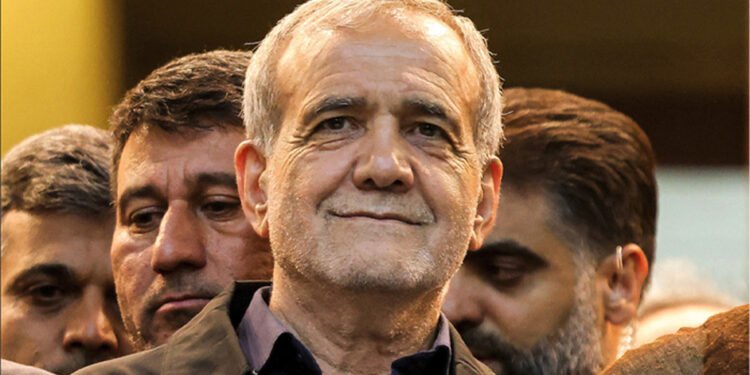Iran’s reformist candidate Masoud Pezeshkian yesterday won a runoff presidential election against ultraconservative Saeed Jalili, the interior ministry said.
Pezeshkian received more than 16 million votes and Jalili more than 13 million out of about 30 million votes cast, electoral authority spokesman Mohsen Eslami said, adding that voter turnout stood at 49.8 percent.
The number of spoiled ballots was reported to be over 600,000.
Pezeshkian said the vote was the start of a “partnership” with the Iranian people.
“The difficult path ahead will not be smooth except with your companionship, empathy, and trust. I extend my hand to you,” Pezeshkian said in a post on social media platform X, after on Tuesday saying he would “extend the hand of friendship to everyone” if he won.
The election, called early after the death of ultraconservative president Ebrahim Raisi in a helicopter crash, followed a first round marked by a historically low turnout last week.
Iran’s supreme leader Ayatollah Ali Khamenei, who wields ultimate authority, had called for a higher turnout in the runoff, emphasising the importance of the election.
He said the first round turnout was lower than expected, but added that it was not an act “against the system”.
The ballot comes against a backdrop of heightened regional tensions over the Gaza war, a dispute with the West over Iran’s nuclear programme, and domestic discontent over the state of Iran’s sanctions-hit economy.
In last week’s first round, Pezeshkian, who was the only reformist allowed to stand, won the largest number of votes, around 42 percent, while Jalili came second with around 39 percent, according to figures from Iran’s elections authority.
Only 40 percent of Iran’s 61 million eligible voters took part in the first round, the lowest turnout in any presidential election since the Islamic Revolution of 1979.
The candidacy of Pezeshkian, a relative unknown until recently, has raised the hopes of Iran’s reformists after years of dominance by the conservative and ultraconservative camps.
Iran’s main reformist coalition supported Pezeshkian, with endorsements by former presidents Mohammad Khatami and Hassan Rouhani, a moderate.
Pezeshkian, a 69-year-old heart surgeon, has called for “constructive relations” with Western countries to revive the nuclear deal in order to “get Iran out of its isolation”.
Pezeshkian vowed to ease long-standing internet restrictions and to “fully” oppose police patrols enforcing the mandatory headscarf for women, a high-profile issue since the death in police custody in 2022 of Mahsa Amini which sparked months of nationwide unrest.
Meanwhile, Pezeshkian received congratulations for his victory from around the world, most notably from Indian Prime Minister Narendra Modi, Russian President Vladimir Putin, Chinese President Xi Jinping, Syrian President Bashar al-Assad, Saudi Arabian King Salman, United Arab Emirates President Sheikh Mohamed bin Zayed Al Nahyan, and the emirs of Qatar and Kuwait, according to news agencies.
“Looking forward to working closely with you to further strengthen our warm and long-standing bilateral relationship for the benefit of our peoples and the region,” Modi wrote on social media platform X.
“I hope that your tenure as president will contribute to a reinforcement of constructive bilateral cooperation between our friendly peoples,” Putin said in a message to Pezeshkian.
The two countries, the target of stiff Western sanctions, can “coordinate efforts to resolve international issues in a constructive manner,” he said.
“I attach great importance to the development of China-Iran relations and am willing to work with the President to lead the China-Iran comprehensive strategic partnership towards deeper advancement,” state news agency Xinhua reported Xi as saying.
The two countries “have a long history of friendly exchanges, and bilateral relations have maintained healthy and stable development… for over half a century,” Xi said, according to Xinhua.
“Faced with complex regional and international situations, China and Iran have always supported each other, worked together and continued to consolidate strategic mutual trust,” he added.
“(This) has not only brought benefits to our two countries’ peoples, but has also made active contributions to promoting regional and world peace and stability,” he said.
In a message published on the Syrian presidency’s social media accounts, Assad said: “We are keen to ensure that our relationship remains at its peak”.
He added that he wants to work with Pezeshkian “to strengthen the Syrian-Iranian strategic relationship” and that “resistance will remain the common approach we follow.”
King Salman, in a message to Pezeshkian, expressed hope for the “continued development of relations which link our two countries and our two brotherly peoples,” according to the official Saudi Press Agency (SPA).
He also expressed his wish for further “coordination and dialogue to strengthen regional and international peace and security,” SPA said.
The president of the United Arab Emirates, Sheikh Mohamed bin Zayed Al Nahyan, wished success to Pezeshkian and said he looks “forward to working together to further strengthen ties between the UAE and Iran for the benefit of our two nations and peoples.”
The emirs of Qatar and Kuwait sent cables of congratulations to Pezeshkian, official media reported.
Kuwait’s Emir Sheikh Meshal al-Ahmad Al-Sabah wished “more prosperity and development” for the Islamic republic, the official KUNA news agency said.

























